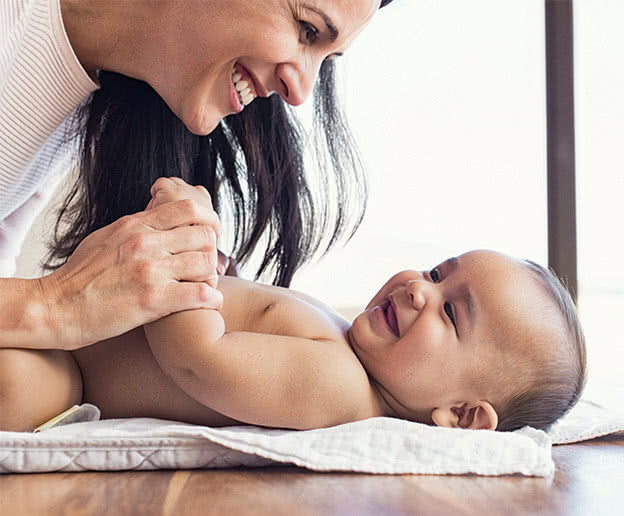
Section
Your Baby’s First 6 Months
Your baby depends on you for everything. He needs you to feed and change him, cuddle and kiss him, play with him, and comfort him. When you respond quickly to his needs, he will cry less. He feels safe and learns to trust.
Your baby’s brain is growing faster now than at any other time. Your loving care helps him develop. Talk, read, and sing to him as much as you can.
Where to Find Help
Help with discipline problems and parent stress; child abuse prevention.
1-800-422-4453
Information from the American Academy of Pediatrics on children’s health, safety, and well-being.
Things You Can Do
Give Your Baby Loving Care
Hug, cuddle, and kiss your baby.
Chat or sing to him.
Talk to him in a soothing voice.
Make routines for feeding, changing, napping, and bathing. Routines help babies feel safe and secure.
Respond to your baby’s cries right away. This will not spoil him.
Avoid Secondhand Smoke
Your baby’s lungs are still developing. Ask people not to smoke or vape around your baby, or in your house or car. Breathing smoke can make him more likely to get ear infections, asthma, or sudden infant death syndrome (SIDS).
Help Your Baby Get to Sleep
Newborns may wake up several times at night. They take longer to go into a sound sleep than older babies. To help your baby sleep, put him in his crib when you see signs that he is sleepy, such as yawning or fussing.
Your Baby Is Developing
From birth to 3 months, your baby will begin to:
Grow quiet when he hears familiar voices and sounds.
React to loud noises.
Make soft sounds.
Start to smile.
From 3 to 6 months, he will:
Hold up his head.
Turn toward sounds.
Begin to make sounds like “ga,” “ooh,” and “ba.”
React to a change in your tone of voice.
Tune in to Your Baby’s Moods
When your baby is awake and alert, he is ready to play. When he looks away, he needs to rest. When he is fussy, he wants comfort. As you get to know your baby, you will learn what he needs.
Have “Conversations” with Your Baby
Between 1 and 3 months, your baby will start to communicate with you, without words. He will find out that when he smiles, you will smile back. He will gurgle or coo so that you will make noises back. These “conversations” help him grow close to you. They are part of his brain growth.
Comfort Your Baby When He Cries
When your baby cries, pick him up right away. See if he is wet, hungry, or in pain. Take him into a dark, quiet room. Try different ways to comfort him until you find something that works. Here are some ideas:
Wrap him snugly in a blanket.
Walk with him in a carrier on your chest.
Hold him close to your chest with skin-to-skin contact.
Gently rock him up and down or in a rocking chair.
Hum, sing, or speak softly.
Lay him on his tummy across your knees and gently rub his back.

Your baby will look at you and make sounds and faces. When he looks away, he needs a rest.
If Your Baby Can’t Stop Crying
Colic is when a baby cries hard without stopping, even though he does not need to be fed or changed, and he is not in pain. Colic can happen between 3 weeks and 3 months of age. Most babies with colic are healthy. Ask your doctor to be sure.
To help prevent colic, try not to tire your baby, especially in the late afternoon and evening.
Sometimes nothing helps. This does not mean you are a bad parent. You just have to be patient.
Never Shake a Baby
Never shake or hit your baby—this can cause blindness, brain damage, or even death. If you start to lose your temper, put your baby in his crib, walk into the next room, and count to 10. If you cannot calm down, get help. Ask a friend or relative to give you a break. Or call the National Parent Helpline.